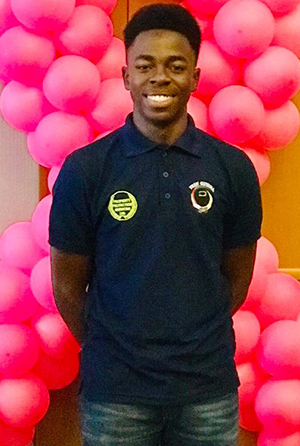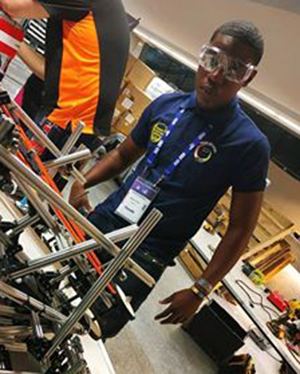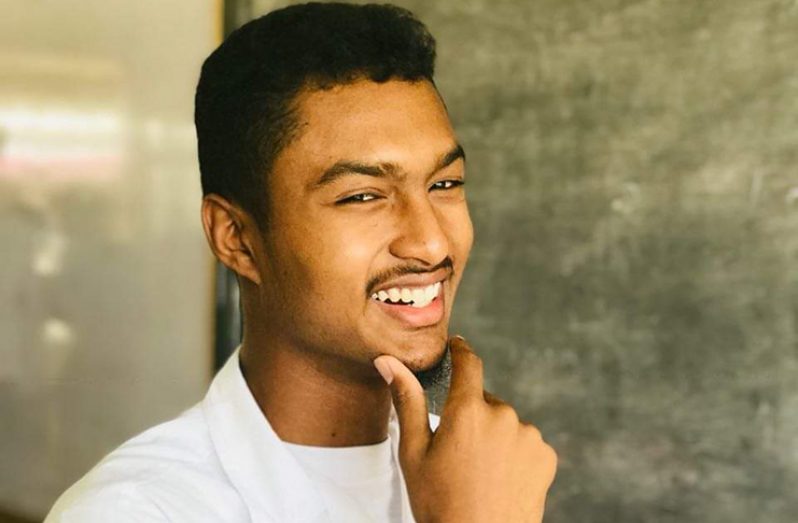Changing the lives of young people
By Gibron Rahim
WE live in a time of rapid technological advancement. Young people, in particular, are leading the way into the future with drive and dedication. STEMGuyana is at the forefront of training and empowering young people to live up to and even beyond their potential. Indeed, the impact on their lives goes well beyond the knowledge they gain.

Jahi Ghansam joined STEMGuyana in October 2017. He told the Pepperpot Magazine that he met the organisation through a seminar held at Starr Computers. He recalled that STEMGuyana showcased a robot that could build a Rubik’s cube at that event. “And that really grasped my attention and I wanted to find out more about what they do,” he said.
Jahi has learnt numerous soft skills as a result of being a part of STEMGuyana. Notable among them are critical thinking skills and cohesive skills. He admitted that he had always been a shy person who kept to himself. However, working in teams brought him out of his shell. He recalled that there was a competition involving a Lego Mindstorm Kit earlier this year. That was his group’s first major project amongst themselves. “It was nice working with a team,” said Jahi. “We learnt stuff like programming the robot [and] building it, you had to think outside the box.” Such experiences motivate participants to leave their comfort zones and express themselves, he explained.
The skills Jahi has gained can be applied to other life challenges. He related that he used to fear presentations but now he flows with them. His interactions with other people have improved. His area of interest is computer science which he studied at the Government Technical Institute (GTI). Jahi’s goal is to work in software development. “You need problem-solving skills and [STEMGuyana] aided in the development of such skills,” he said.
STEMGuyana provides opportunity and exposure according to Jahi.

“They give youths who don’t really have much exposure to technology a chance to showcase their talents,” he stated. He pointed out that a lack of finances can act as a barrier in today’s world. He noted that STEMGuyana currently has numerous ongoing programmes. Among them is the FIRST Global Challenge which was started in 2017. Guyana took the 10th position in last year’s competition. Jahi took part in that competition. He related that he got the opportunity to travel overseas and meet new people while at the same time getting to work with his team on their project. There is also the Scratch Programming League which introduces coding in a child-friendly manner to youths across Guyana.
Michael Sampson has also been part of STEMGuyana since October 2017. He was part of the same GTI computer science class that attended the seminar at STARR Computers. He recalled that computer programming, an area he is interested in, was mentioned among the programmes being offered. “I went up to them, had a conversation with them and found out how I could join and that was where I started from,” he said.
Michael mentioned critical thinking as one of the skills he has learnt since being part of STEMGuyana. He noted that he has found greater confidence in his work. “I communicate better with persons,” he explained. “I look at problems differently from how I previously used to look at them.” Michael pointed out that before STEMGuyana he was not very confident speaking to or approaching people he did not know. “I was not confident in sharing my ideas and thoughts on various issues but since I actually got involved in STEMGuyana my confidence level has risen,” he added. He has greater self-awareness and now notices flaws in old habits. “I try to improve them on a daily basis to make myself a better person.”
Being part of STEMGuyana has taught Michael that hard work pays off. This was particularly evident to him this year when he was part of the team that represented Guyana at the 2018 FIRST Global Robotics Challenge that was held in Mexico City. He related that STEMGuyana encourages young people to get involved in science and technology by introducing an element of fun to the process. As an example, he said that many children enjoy receiving remote-controlled toys at Christmas. STEMGuyana teaches skills to actually build them. “Anything that you can imagine it’s actually there for you to implement and that’s something really exciting for young people to actually know.”
Ghwan Lynch found out about STEMGuyana last year through a flyer that was posted about an exhibition showcasing the robots created by Team Guyana Robotics. That same team had competed in the FIRST Global Robotics Championship in Washington DC in 2017. He was fortunate to have a close friend who was involved with STEMGuyana. “Later that day, after consulting with that friend, he gave me some directions and he also bought a ticket for me to attend the exhibition,” he explained. He attended the event and was amazed by the national team’s robots. He decided to find out how he could become a part of STEMGuyana.
Though the process took a while, it all worked out according to Ghwan. “I was exposed to technology on a different level,” he said. He recalled that co-founder Karen Abrams was very encouraging and this contributed to him leaving sessions feeling inspired. He began attending classes, going to voluntary occasions and interacting with people. He learnt more about Lego Robotics and worked on simple building projects. Things progressed in this manner for months until around this past January when Ghwan decided that his next goal was to become part of the national robotics team.
Ghwan took part in various competitions leading up to a grand final competition. For a final project, with help from his coach, they were able to build a robot. “The robot took me three days to build because of school and lessons and so on,” he recalled. Ghwan had to present on the robot he built and share his reasoning behind building it and the problems it would solve. “From then I started to gain more confidence,” Ghwan stated.
As the FIRST Global Robotics Championship drew nearer, the national team’s robotics kit arrived and Ghwan and his fellow members started brainstorming ideas. They spent up to 17 hours going through ideas on some days. “Because of that energy that I brought, because of that value, I was then selected to be a part of the national team.” Ghwan’s motivation has not waned even though that goal was accomplished. “Every day I still feel more in terms of inventing and doing new stuff,” he said. “Even down to today I still feel that need to give back and to share my knowledge with persons who were not fortunate enough to make the national team or with persons who are interested in robotics.”



.jpg)








